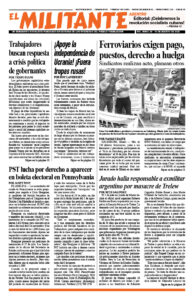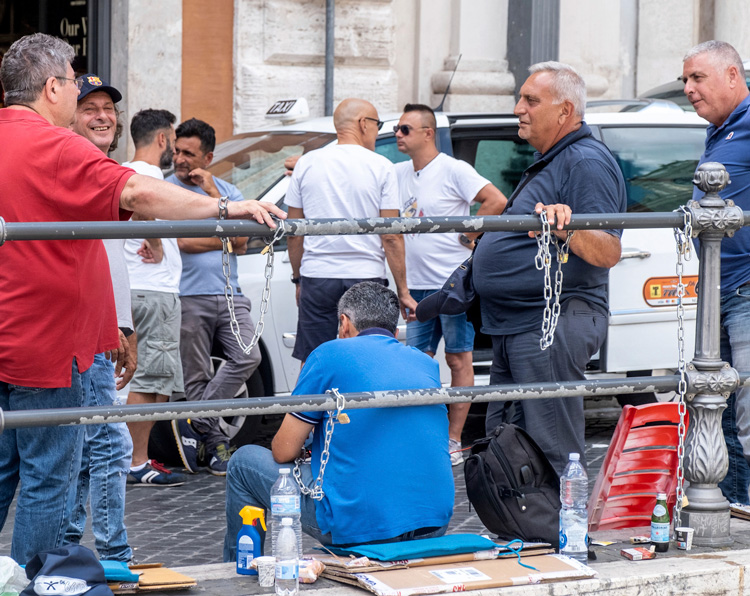Italian Prime Minister Mario Draghi resigned, and his government coalition collapsed July 21, the same day the European Central Bank boosted interest rates, sharply raising the cost of loan repayments for the more heavily indebted capitalist powers across the southern eurozone. The political crisis facing the Italian rulers is exacerbated by the unfolding worldwide economic slowdown, Moscow’s invasion of Ukraine, and the instability underlying the European Union.
Italy’s propertied rulers preside over the third-largest capitalist economy in the EU, but their government is the second-most indebted and faces the lowest growth forecast of any country in the bloc.
For years the rulers in Germany have used their economic and political domination of the EU to squeeze their rivals and the working classes in the weaker capitalist countries that make up southern Europe. Workers in Greece especially, but also in Italy and Spain, were subject to massive job cuts and the slashing of social services following the 2008 financial crash.
Youth unemployment still stands at more than 20% in Italy. New manufacturing orders across the EU dropped last month, with Italy hit hardest. Orders there plunged at the sharpest rate since the beginning of the pandemic in April 2020.
Alongside this, inflation in Italy hit 8.5% on an annual basis in June. Costs for necessities that working people depend on rose much higher. Utility bills soared 28.1% and transportation costs increased 13.1%. Cabin crews, air traffic controllers and pilots at several airlines struck for the third time in a month July 17, demanding bosses reverse pay cuts and provide meals and water to crews on longer flights.
A former European Central Bank chief, Draghi was appointed, not elected, prime minister last year to head up a “national unity” government in Rome and deal with the deepening crisis facing the country’s rulers. The EU responded by agreeing to give Italy 200 billion euros in post-pandemic relief over the next four years. The handout came with several conditions, as is usually the price for such concessions. These include demands that Rome step up privatization of state-owned companies and cut government debt, at the expense of working people.
Draghi quit when three parties in his government coalition refused to back him in a no-confidence vote, reflecting a political crisis for Italy’s capitalist rulers. New elections are set for Sept. 25. A coalition of conservative parties more hostile to the EU is ahead in the polls. It includes former Prime Minister Silvio Berlusconi’s Forza Italia.
Fantasy of a European superstate
Now a bloc of 27 states, the EU was established out of the carnage of the second imperialist war with hopes of rivaling Washington, which had emerged as the world’s dominant imperialist power. But prospects for forming a common European superstate were always a fantasy given the intractable conflicts underlying capitalist nations and their inevitable competition for markets, resources and profits. The current worldwide economic slowdown sharpens the fissures tearing at the bloc’s seams.
For the first time since 2011 the European Central Bank raised interest rates in an attempt to rein in inflation. This makes it more expensive for the rulers in the most indebted governments in the bloc to repay loans. Across the 19 countries using the euro, inflation varies widely, from 6.8% in France to 22.7% in Estonia.
All the capitalist rulers adopting the “common currency” of the euro abandoned the power held by their central banks to set interest rates or to print money. Most capitalist governments try to buffer the impact of economic crises and get ahead of rivals by devaluing their own currencies to fuel exports and production, but this is closed to eurozone members, who have no national currency. From its birth in 1999 the euro’s stability has been undermined by the conflicts among the rival powers that it pretends to join together, to the advantage of the German rulers.
At recent acrimonious EU summits, officials have fought over whether the strongest capitalist states — Germany and France — will extend their domination, or be saddled with the mounting debts of their weaker adversaries. The European Commission threatened to sanction the Italian government in 2018 when it adopted a budget that broke with EU rules.
Last year the liberal editors of the Economist castigated Italian workers for the country’s yearslong crisis, blaming them for electing politicians like Berlusconi who prioritized what they saw as Italy’s special interests, and who needed to be told to “shut up and behave.”
Russian invasion boosts EU tensions
The war in Ukraine is the largest in Europe since World War II. It has led to shifts in the U.S.-dominated “world order,” causing rival capitalist ruling classes to reassess how best to protect their national interests.
Exacerbating conflicts within the EU are looming energy shortages as Moscow limits gas supplies to Europe, pressing governments to acquiesce to its drive to conquer Ukraine and destroy its national sovereignty.
Draghi’s government tried to cut Italy’s dependence on Russian gas supplies. But the country still relies on Moscow for 25% of its gas, down from 40% before the invasion of Ukraine. The Financial Times anticipates that a new conservative government in Rome will be “more welcoming of a negotiated solution” to the invasion than Draghi, code words for forcing Ukraine to accept that it must relinquish territory Moscow has seized.
Conflicts among the rival EU “partners” will deepen, as will the assaults on working people at home.


